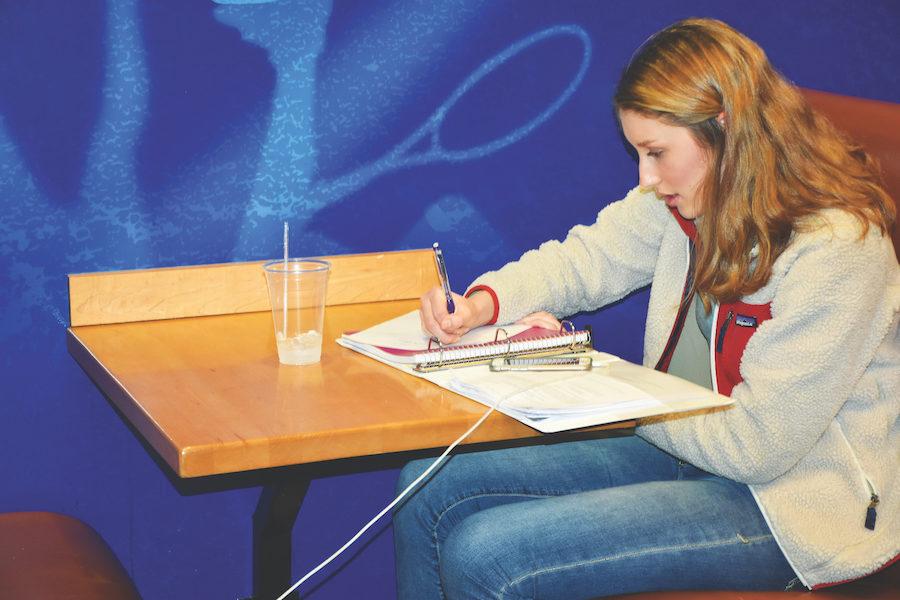M.A.C. and Lincoln partnership reaps benefits for both sides
While Lincoln High School may be sub-par in size and amenities, the nearby Multnomah Athletic Club isn’t, giving many students what they are lacking at the school.
Many Lincoln students come from families who are members at the M.A.C. and they often find themselves migrating back and forth throughout the school week and even the weekend.
Lincoln and the M.A.C. have both embraced this unique opportunity, which allows the two to act as one big campus in many ways. Mike Donovan, M.A.C. Camp and Class Supervisor, sees it as a win-win situation.
¨The partnership [between] the M.A.C. and Lincoln athletics is really strong and it’s good for both,¨said Donovan, ¨It’s one of those partnerships that just makes sense.¨
Not all Lincoln students get to take advantage of the relationship. Individuals whose families are not members or who are not playing for school teams have only limited access to the club and its facilities. But for those who play for the some of the school’s sports teams, the relationship means they get to use the M.A.C.’s conveniently located facilities.
Lincoln water polo player Alexandra Miller explained that a M.A.C. member, Bud Lewis, a water polo advocate, is the person who gets the Lincoln team access to the M.A.C. facilities.
“He gets us the pool to practice in and our team banquet at the end of the season is also at the M.A.C. Ballroom because of Lewis,” Miller said.
Theo Geist, another Lincoln water polo player, said that “The M.A.C. facilities are very nice. It’s a big pool so we get to practice sprinting. The pool is good for conditioning and we have lots of room for passing.”
He also said that some of the pools that their competitors use are a lot smaller and hotter, which is “not very enjoyable to play in. We have a lot of room to practice different drills amongst each other. We don’t all have to do the same thing at once.”
The tennis team also benefits.
Lincoln tennis player Clayton Allen explained that “this is the first year in a very long time that the tennis team has been able to officially use the tennis courts at the M.A.C…. The athletic director at the M.A.C. decided that we could have team practices now and get half of the courts there. It’s a really awesome resource because we can just walk across the street and play tennis.”
Lincoln also has opportunities to help out the M.A.C., as well. Lincoln provides its football field for summer camps that could not function unless it was for Lincoln. Donovan had a great relationship with former athletic director Jeff Peeler and plans to meet with new director Jessica Russell soon.
The close proximity of the club — it is just across Southwest 18th Avenue from the Lincoln campus — also allows students to go to the M.A.C. for lunch. This benefits the club and frees up space for other students in the already crowded hallways at Lincoln. The M.A.C. is constantly attempting to please the youths and provide them what they need to keep their experiences content and well.
¨It benefits the M.A.C. to have younger people around. We do our best to provide things that they’ll want to do and space for them to use, ¨ said Donovan.
The club is aware that in order to keep the well being, the youths must enjoy their time at the M.A.C. so that they will continue their own membership when the time comes. This passing of the baton from youth member to full members allows for the full members to be more understanding of the youth, as they were often a youth member once.
George Green, youth member and sophomore at Lincoln, is a constant user of his membership.
¨The M.A.C. gives me a place to work out, but also to study and meet new people,¨ said Green.
However, while Lincoln athletic teams are allowed to use the M.A.C. as a group, that doesn’t mean that a team member who is not a M.A.C. member can walk in to use the club on his or her own.
The club does offer a social guest system, through which a youth member can sign in a non member to eat or hangout, but the rules for guests are strict and they may not use athletic facilities.
Ethan Salinsky, a junior who is not a M.A.C. member, mentioned that the ability to sign in as a guest allowed him to remain with friends.
“When I really want to go, one of my friends can sign me in,” said Salinsky.
Edward Simms, school security officer, noted the issues with student leaving class to go to the M.A.C. While the club offers many good and beneficial amenities, it also is a temptation for some Lincoln students.
“I don’t have a problem with students going to the M.A.C., I have a problem with students being late to class,” said Simms.

